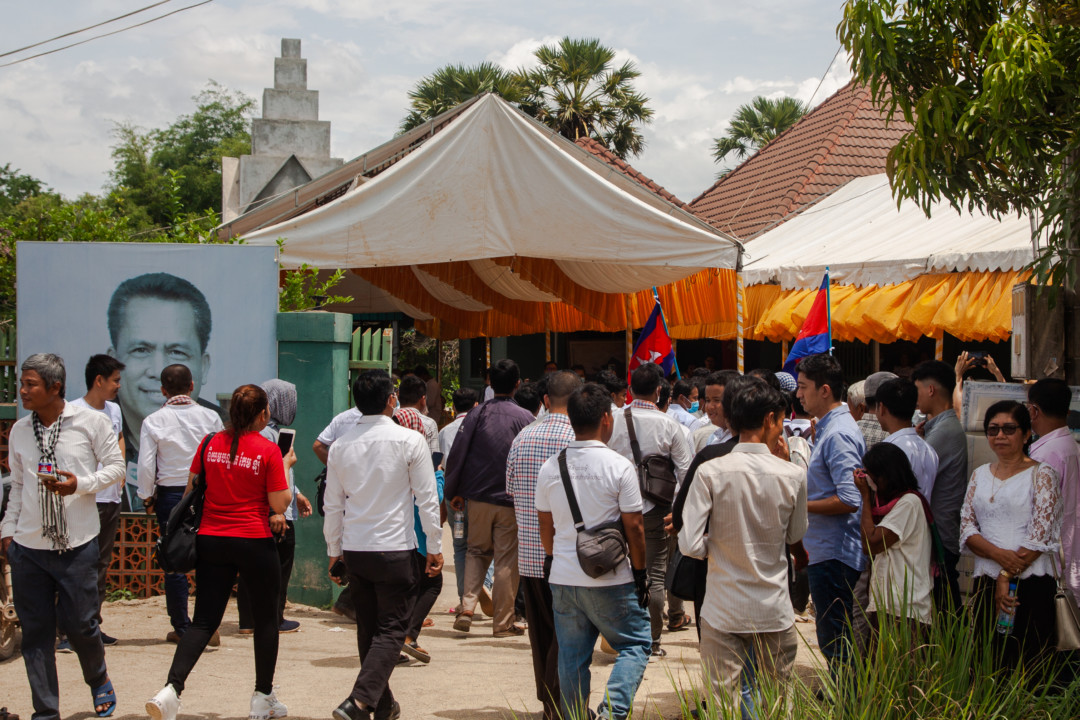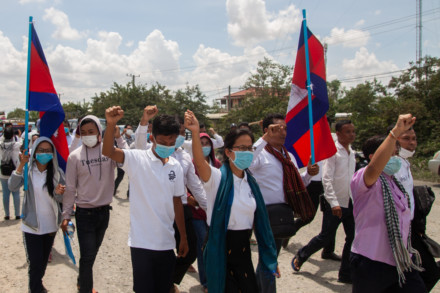10 July 2016
Phnom Penh, Cambodia
Kem Ley
Profession
Community
Politics & Governance
Motive
Environmental and indigenous activism
Exposure of illegal activity
Political dissent


Adolfo Olivas


Ahmed Divela


Amit Jethwa


Artan Cuku


Babita Deokaran


Bayo Ohu


Berta Cáceres


Bhupendra Veera


Bill Kayong


Boris Nemtsov


Boško Buha


Chai Boonthonglek


Charl Kinnear


Chut Wutty


Chynybek Aliev


Cihan Hayirsevener


Daphne Caruana Galizia


Darío Fernández


Derk Wiersum


Deyda Hydara


Édgar Quintero


Edmore Ndou


Edwin Dagua


Federico Del Prete


Fernando Villavicencio


Gezahegn Gebremeskel


Gilles Cistac


Habibur Mondal


Igor Alexandrov


Jacob Juma


Ján Kuciak


Javier Valdez


Joannah Stutchbury


José Ángel Flores


Jules Koum Koum


Kem Ley


Luis Marroquín


Mahamudo Amurane


Marcelo Rivera


María Elena Ferral Hernández


Marielle Franco


Milan Pantić


Milan Vukelić


Muhammad Khan


Nelson García


Nihal Perera


Oliver Ivanović


Orel Sambrano


Perween Rahman


Peter R. de Vries


Rajendra Singh


Salim Kancil


Sandeep Sharma


Sikhosiphi Radebe


Slaviša Krunić


Soe Moe Tun


Victor Mabunda


Virgil Săhleanu


Wayne Lotter


Yuniol Ramírez


Zezico Guajajara
10 July 2016
Phnom Penh, Cambodia
Profession
Community
Politics & Governance
Motive
Environmental and indigenous activism
Exposure of illegal activity
Political dissent
On 10 July 2016, Kem Ley was in the convenience store of a petrol station on Phnom Penh’s arterial Monivong Boulevard, when a man entered and fired two shots, hitting Ley in the chest and head, killing him. The gunman fled but did not get far before he was caught and beaten by members of the public.
The killer, who was later detained by the police, was identified as Oeuth Ang, a former forest ranger and soldier. Ang claimed that he had killed Ley over an unpaid debt of US$3 000, but neither Ley’s family nor Ang’s wife believe that Ang knew his victim. Few consider Ang’s actions to have been committed independently, evoking instead memories of Cambodia’s long history of contract killings. Rather, Ley’s murder has become an enduring image of the consequences of speaking out against corruption in Cambodia, including corruption related to the environmental sector.
A physician by trade, Ley was a prominent political commentator and activist. Just four days before his death, Ley had given an interview to Radio Free Asia in which he discussed a report from corruption and environmental watchdog Global Witness, which dealt with, among other things, illegal logging in Cambodia. Across the Cardamom Mountains, in the Prey Lang Wildlife Sanctuary and the north-eastern provinces of Mondulkiri and Ratanakiri, logging operations are widely understood to be conducted by powerful businesspeople, eager to harvest valuable timber resources under the protection of corrupt state actors.
The nexus between corruption and the environment has created a system that enables illicit logging to flourish, ‘establishing networks of mutual dependence between nuclei of power and wealth in the government, military and private sector that make it difficult for those operating outside the system to thrive’, as reported by the Global Initiative Against Transnational Organized Crime in September 2022. As consequence of illegal logging dynamics in the country, it is believed that Cambodia has lost some 2.6 million hectares of forest cover since 2001.
Ley was no stranger to speaking freely on the matter of this widespread corruption. A veteran activist, Ley had been a board member of the Cambodian Center for Human Rights (CCHR) between 2012 and 2014, and had gone on to found the Young Analysts Group in 2015, with the objective of building youth engagement in civil society. In the same year, Ley had co-founded the Grassroots Democratic Party (GDP), a political party aimed at empowering rural Cambodians and farmers.
‘Kem Ley did research-based advocacy that effectively increased public awareness, public demands and responses to a broad range of social issues, such as education, health, poverty and forced evictions,’ said Yeng Virak, one of the GDP’s co-founders, who carries on the party’s message going into the 2023 elections.
Shortly before the launch of the GDP, Cambodia had been in the grips of post-election protests, with hundreds of thousands of Cambodians taking to the streets to challenge Hun Sen over perceived irregularities in the 2013 elections and dire working conditions in the garment sector. The government’s willingness to open fire on protesters prompted fear among many that Cambodia was sliding back into the violence that had consumed the last three decades of the 20th century.

He was buried in his hometown in southwestern Cambodia's Takeo province on July 25 after a weekend funeral procession that drew as many as two million mourners.

The risks associated with anti-corruption work did not go unnoticed by Ley, who reportedly told his friend and fellow political analyst Cham Bunthet a week before his death that he feared his activism could cost him his life. As Virak noted, ‘Kem Ley had spoken out on many critical and sensitive issues, but speaking on radio about the Global Witness report was the most sensitive one.’ While not a uniquely Cambodian phenomenon, the prevalence of corruption and its systemic nature commonly factors into assassinations, while simultaneously enabling those behind it to evade justice.
Ley documented these issues in the form of fables, many written in the style of George Orwell’s Animal Farm, which highlighted the key problems facing Cambodians. These were problems that Ley had spent time grappling with during his ‘100 Nights’ campaign, which saw him travel across the country, staying with villagers and listening to their grievances. All of this, Ley had hoped, would help bring to light the realities of Hun Sen’s then-30-year reign and the impact that his increasingly dictatorial style of governance was having on the people he claimed to represent.
Ley’s political activism was a radical act of bravery against the backdrop of Hun Sen’s stranglehold on Cambodia’s civil space. His assassination opened up old wounds for an aggravated Cambodian public and thousands took to the streets in outrage. Indeed, few Cambodians were convinced that justice had been done, citing Ang’s contradictory testimony, the apparent lack of thoroughness of the police investigation and the speed with which Ang was convicted and handed a life sentence in March 2017.
‘The fact that Kem Ley publicly commented on the ties between Cambodia’s ruling family and the private sector merely a few days before being killed can only raise questions as to the real perpetrators and the true motive behind his murder,’ said Chak Sopheap, a former member of the Young Analysts Group and current director of the CCHR.
Sopheap remembers Ley as a human rights defender renowned for pursuing the truth and for speaking out against the corruption and injustice affecting the lives of ordinary Cambodians, but she points to the authorities’ lack of interest in investigating his murder.
‘The CCHR recalls that the investigation conducted by the Cambodian authorities lacked thoroughness and transparency,’ she said. ‘Furthermore, Oeuth Ang’s trial, which was widely criticized for its failure to meet international fair trial standards, raised more questions than it answered, leaving many people to think there was a mastermind behind the murder.’
‘The trial lasted just four hours, with no questions asked about any possible orders being given. Oeuth Ang was then swiftly sentenced to life imprisonment. This means that Kem Ley’s true killer may be roaming freely,’ she added.
When asked whether he felt that Ang was the sole culprit in Ley’s assassination, Virak of the GDP said, ‘No, he was a scapegoat, such as Borng Samnang and Sok Sam Oeurn,’ referring to the two men charged with the murder of trade unionist Chea Vichea in 2004. ‘It was unacceptable by normal criminal justice standards,’ Virak said of the investigation into Ley’s killing and Ang’s trial. ‘It was carried out in a rushed way with a lot of questions raised that required a proper and independent investigation.’ The belief that Ley was murdered for his activism is a deeply held conviction for Virak, as it is for many Cambodians. Virak maintains that Ley was silenced by ‘those who wanted to maintain the status quo’.
But if those behind the killing had hoped to silence critics of the government, Virak is quick to point out how they failed. In the years since the murder, on 10 July, tens of thousands of Cambodians – a mix of civil society members, activists, unionists, environmentalists and political analysts – have rallied around the petrol station where Ley was killed and then travelled some 85 kilometres to the slain activist’s house in Takeo province. ‘His death has inspired people to speak out,’ said Virak. ‘His courage to speak truth to power has inspired many people, especially the youth.’
Cambodian authorities have stepped up efforts to quash these memorials, even deploying militarized police in 2019. But even as the risks for activists mount in Cambodia, few of Ley’s supporters have been deterred from visiting his house in Takeo province, and these acts of commemoration and resistance have continued in spite of the government’s increasingly oppressive approach.
In a village in Takeo, 81-year-old Phork Se – Kem Ley’s mother – notes that although shocking, the precedent for killing those who dare to speak out against wrongdoing is well established and casts further doubt on Ang having been solely responsible for her son’s murder.
But while the impact of Ley’s assassination has been keenly felt by Cambodians eager to push for change in a political landscape long dominated by a network of patronage, for Se, her son’s death is somewhat divorced from the political significance it has accumulated. ‘I miss him every day,’ she said. ‘It’s been many years, but it is still like yesterday for me.’


20 July 2010
Gandhinagar, India
Amit Jethwa


15 October 2016
Mumbai, India
Bhupendra Veera


21 June 2016
Sarawak, Malaysia
Bill Kayong


11 February 2015
Klong Sai Pattana, Thailand
Chai Boonthonglek


26 April 2012
Koh Kong, Cambodia
Chut Wutty


5 May 2004
Bishkek, Kyrgyzstan
Chynybek Aliev


20 August 2000
Dhaka, Bangladesh
Habibur Mondal


16 October 2018
Haripur, Pakistan
Muhammad Khan


5 July 2013
Deraniyagala, Sri Lanka
Nihal Perera


13 March 2013
Karachi, Pakistan
Perween Rahman


19 June 2018
India
Rajendra Singh


26 September 2015
Selok Awar-Awar, East Java, Indonesia
Salim Kancil


24 March 2018
Bhind, Madhya Pradesh, India
Sandeep Sharma


13 December 2016
Monywa, Myanmar
Soe Moe Tun